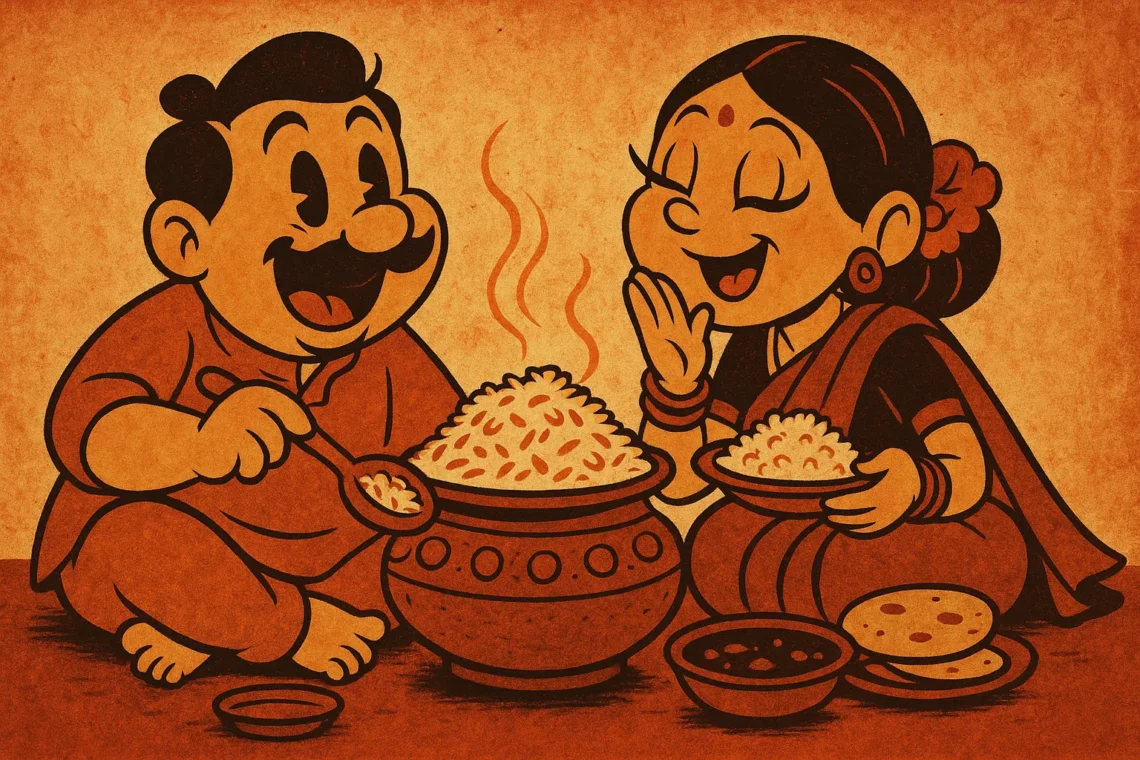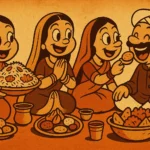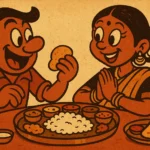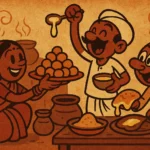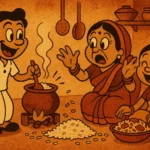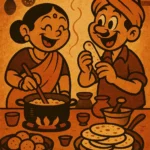Some people remember weddings for the outfits. Some for the music. Some for the endless photo sessions and the embarrassing dance routines. But if you grew up in India—or anywhere near an Indian wedding—you know the truth: it’s all about the food. And not just the big wedding lunch or the carefully curated dessert table. No, the real magic happens after the lights dim, the relatives settle, the make-up starts to slide, and someone whispers the most sacred words of the evening: “Midnight biryani aa gaya.”
This is not the biryani served during the formal reception. That one is polite, served on decorated plates, garnished with fried onions and raita on the side. Midnight biryani is different. It arrives casually, almost secretly. Usually in steel dabbas or foil containers, steaming and unapologetic. It doesn’t ask for presentation. It just arrives, like a rumor confirmed. And it tastes better than anything that came before it.
Secret, Spicy, and Always Worth the Wait
By the time midnight biryani shows up, the bride’s mascara has smudged, the uncles have started snoring, and the cousins have taken over the venue’s side room with gossip, laughter, and stolen gulab jamuns. Someone sneaks away to the kitchen and returns with a nod. The biryani is ready. Instantly, there’s energy. Plates are fetched. Hands washed. Small groups gather in circles—on beds, on staircases, near fans—ready for the second dinner that everyone knew was coming.
This biryani doesn’t need a spoon. It’s scooped by hand or served with that one steel cup with the bent rim. It might be mutton or chicken, but it will always be spicy, a little oily, and fragrant in a way that makes your stomach rumble despite already being full. The rice is perfectly uneven—some grains spiced, some soaked in meat juices, some kissed by burnt onion. And it always comes with whispers.
The Gossip Garnish
Midnight biryani isn’t just a dish—it’s an event. It’s when the real conversations happen. Who was flirting with whom. Who’s already planning the next wedding. Who changed outfits three times. Which aunt brought the pickles. Who cried during the pheras. And always—always—someone says, “This is better than the main dinner, na?” It’s not a question. It’s a truth accepted in silence, between mouthfuls of steaming rice and meat that falls apart on the tongue.
It’s also when secrets are shared. Between cousins who haven’t met in years. Between friends who are now old enough to sit apart from the adults. Between aunts whispering about dowry, divorce, matchmaking. You’ll forget the speeches. You’ll forget the centerpieces. But you’ll never forget the taste of that biryani paired with the sound of gossip in a dimly lit hallway at 1:30 a.m.
The Smell That Stays
Even the next morning, the scent lingers. On your fingers, in your clothes, in the corners of the house where someone reheated the leftovers. If you’re lucky, there’s a little bit stashed in the fridge. Cold biryani, eaten directly from the container while standing barefoot on the kitchen tiles—it’s practically a tradition. No cutlery, no shame. Just nostalgia and spice.
I’ve attended weddings in fancy banquet halls and five-star hotels, with buffets longer than runways and chefs in toques carving roasts under spotlights. But the best meal? Always the midnight one. The one that wasn’t planned for the guests, but for the insiders. The ones who stayed late. The ones who helped with the pheras, carried extra bangles, kept the kids entertained. This biryani was for them. For us.
Across Borders, Still the Same
Even now, living in Austin, I’ve seen it happen. Indian weddings in community halls, in backyards, in conference centers. The décor may change. The rituals get streamlined. But late at night, there’s always a quiet gathering around a foil tray of biryani. No labels, no garnish, just warm rice and that unmistakable smell. And somehow, it always tastes like home.
Because midnight biryani isn’t about hunger. It’s about belonging. It’s about the meal that comes after the performance is over. When the cameras are off, the heels are off, and the hearts are full. It’s the flavor of a secret shared, a memory created, and a whisper that turns into a story told for years.
So yes, the wedding may be remembered for its grandeur. But what you’ll crave later—the bite you’ll dream of in unexpected moments—is that plate of biryani you ate with your hands at 1 a.m., in borrowed pajamas, on a cousin’s bed, laughing over nothing. That’s where the magic was. That’s where the real feast lived.
Born in Mumbai, now stir-frying feelings in Texas. Writes about food, memory, and the messy magic in between — mostly to stay hungry, sometimes just to stay sane.

